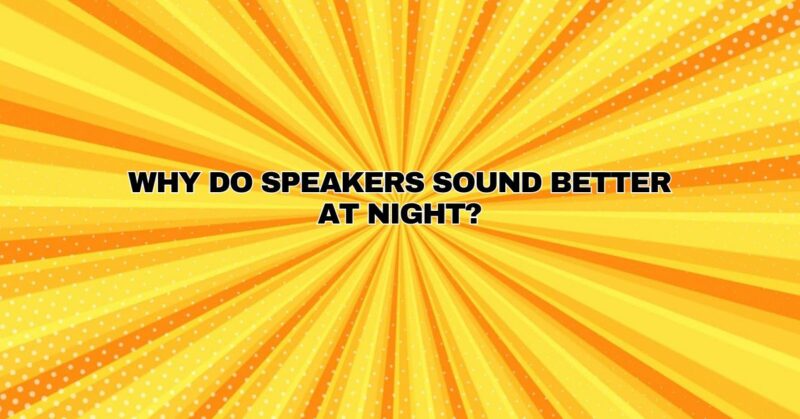The phenomenon of speakers sounding better at night is a curious and often-debated topic among audiophiles and music enthusiasts. Many have reported that their audio systems deliver a more enjoyable and immersive listening experience after the sun sets. In this comprehensive article, we will delve into the factors that contribute to the perception of improved sound quality at night and explore the science behind this intriguing phenomenon.
Factors Influencing the Perception of Better Sound at Night
Several factors can contribute to the perception of improved sound quality from speakers at night:
- Reduced Ambient Noise: One of the most significant factors is the decrease in ambient noise levels during nighttime hours. Traffic, construction, and other outdoor noises tend to diminish after dark, creating a quieter listening environment. This reduced background noise allows listeners to hear finer details and subtleties in the music, contributing to the perception of improved sound quality.
- Room Acoustics: Room acoustics can play a substantial role in sound quality. During the day, the room may be filled with people, furniture, and other objects that can absorb or reflect sound. At night, when the room is typically less crowded, the acoustic properties may change, leading to a different sound profile. In some cases, this can result in a more balanced and pleasant listening experience.
- Psychological Factors: The psychological aspect of nighttime listening can also influence the perception of improved sound quality. Many people associate nighttime with relaxation, unwinding, and focused listening. This mindset can enhance the enjoyment of music and contribute to the perception of better sound.
- Temperature and Humidity: Environmental factors like temperature and humidity can affect the performance of audio equipment. In some regions, nighttime conditions may offer more stable and favorable temperature and humidity levels, which can positively impact speaker performance.
- Calmer Mindset: Listeners may have a calmer and more focused mindset at night, free from the distractions and stresses of the daytime. This mental state can lead to greater appreciation for the nuances and subtleties in music, making it seem like the speakers are performing better.
Scientific Considerations
While the factors mentioned above contribute to the perception of better sound at night, it’s important to recognize that the fundamental characteristics of audio equipment and speakers do not change based on the time of day. The electronics and drivers in speakers operate consistently regardless of the ambient lighting conditions.
However, the listener’s perception of sound quality is subjective and can be influenced by a variety of external and psychological factors. These perceptual changes may lead to the belief that speakers sound better at night.
Practical Tips for Enhancing Nighttime Listening
If you enjoy the experience of better sound quality at night, here are some practical tips to enhance your nighttime listening sessions:
- Create a Calming Atmosphere: Dim the lights or use soft, warm lighting to create a relaxing ambiance conducive to focused listening.
- Optimize Room Acoustics: Consider adding room treatments or diffusers to improve the acoustics of your listening space. These adjustments can have a positive impact on sound quality.
- Minimize Distractions: Ensure that your nighttime listening environment is free from distractions, allowing you to fully immerse yourself in the music.
- Experiment with Speaker Placement: Adjust the placement of your speakers to optimize sound dispersion and imaging. Small adjustments can lead to noticeable improvements in sound quality.
- Listen Mindfully: Approach your nighttime listening sessions with mindfulness and attention to detail. Take the time to appreciate the subtleties in the music.
Conclusion
While the idea that speakers sound better at night is primarily a matter of perception influenced by external and psychological factors, it is a phenomenon that many audiophiles and music enthusiasts enjoy. The quieter nighttime environment, improved room acoustics, and psychological factors can contribute to the perception of enhanced sound quality during nighttime listening sessions.
Ultimately, the enjoyment of music is a highly personal and subjective experience, and different times of day may evoke different emotional responses to the same music. Whether you prefer daytime or nighttime listening, what matters most is the joy and satisfaction you derive from your audio system and the music you love.


